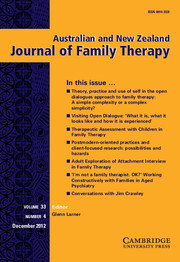Article contents
Is There a Place for Biopsychosocial Formulation in a Systemic Practice?
Published online by Cambridge University Press: 02 March 2012
Abstract
There is a long history of literature concerning integrative practice and how a systemic practice can fit with other models of therapy. Much of this literature has focused on establishing a space for systemic therapy within the dominant medical paradigm, and exploring how the medical model can be enhanced by systemic ideas. The outcome has been better practice, especially in child and adolescent mental health. Interestingly, however, there has been less discussion of the converse: the family therapy literature has rarely considered whether or not systemic practice itself can be enhanced by ideas from the dominant medical model. This article proposes that a biopsychosocial formulation can enhance systemic practice by: (1) holding clinicians accountable for their thinking; (2) facilitating a rigour and attention to detail that may prove useful when therapy falters; (3) opening up other possibilities for intervention; and (4) providing a way to engage with the dominant medical paradigm and support clients in negotiating their way through this system. Potential problems nevertheless arise when integrating a biopsychosocial formulation into a systemic framework. This article identifies these problems and presents ideas for how they can be managed in practice.
Keywords
- Type
- Articles
- Information
- Australian and New Zealand Journal of Family Therapy , Volume 30 , Issue 4 , 01 December 2009 , pp. 269 - 283
- Copyright
- Copyright © Cambridge University Press 2009
- 6
- Cited by


